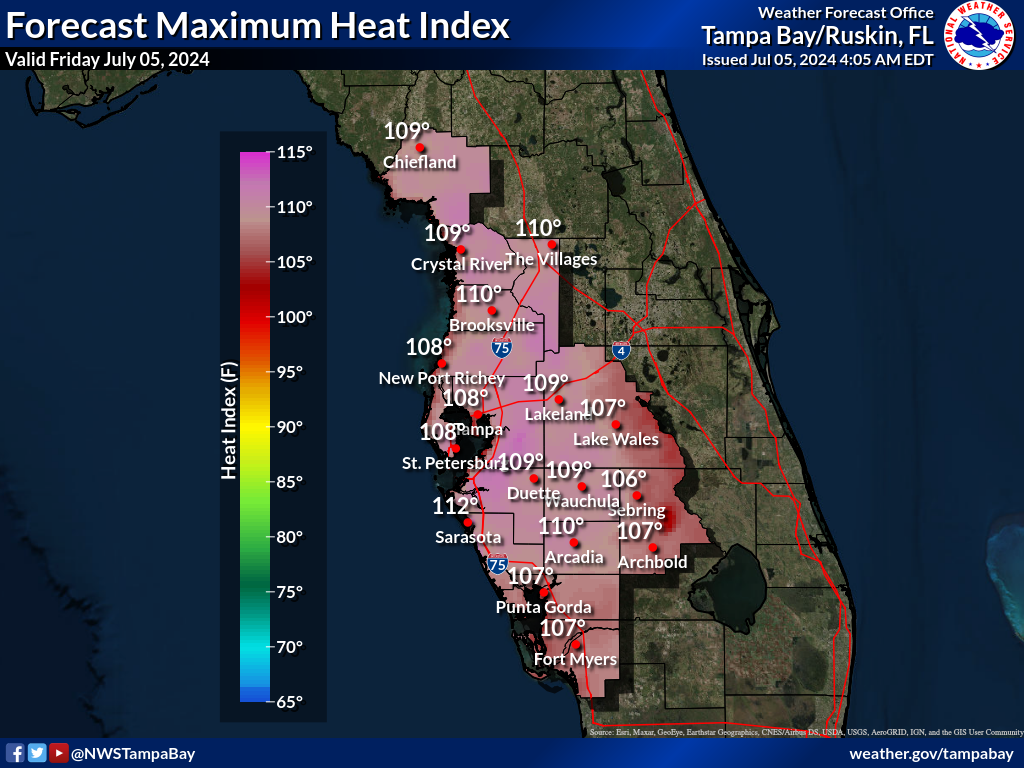Extreme heat, humidity can be dangerous. Here's how to stay safe this summer.

A sizzling hot weekend is ahead as record-breaking temperatures are expected through Sunday across most of the country according to a National Weather Service heat advisory.
Sarasota County got a short break from the extended scorching days due to Saharan dust but that may be ending as temperatures rise again soon. Experts and health organizations are working to ensure that residents and visitors in the Sunshine State know how to stay safe from heat-related illnesses as the summer heatwave takes hold.
Florida's typical heavy summer rainfall patterns balance out the harsh sun, however, experts urge Floridians to take caution when outdoors as feels-like temperatures can often creep into the triple digits.
Heat advisories occurring more frequently
National Weather Service forecaster Rodney Wynn tracks weather across the Southwest Florida region. Six offices around the Sunshine State monitor weather and prepare the public ahead of predicted weather patterns such as heat advisories.
Triple digits temperatures occur most often in the inland parts of Florida, Wynn explained. However, temperatures along the coastal areas of Florida can hang just below the 100-degree mark due to sea winds but can still do harm to the body Wynn said.
For Southwest Florida, weather reaches heat advisory status, due to combination of a lack of rain and high humidity.
“If we don't get our typical showers and thunderstorms here in the day by the max heating of the day, which is around 3:00 or 4:00 in the afternoon, the temperatures just warm up,” Wynn explained
Once air temperatures hold in the mid-90s and combine with the humidity, the heat index values move into the 108 to 112° range, triggering a heat advisory.
“If you’re outside and we are between 60 and 80% humidity, combined with the heat, that temperature just doesn't allow your body to cool down. That heat index value, the 'feel like the temperature' is excessive,” he said.
Rising temperatures and consistent heat advisories have become more frequent over the past 20 years Wynn told the Herald Tribune; though he said heat advisories themselves aren't new.
“The (advisory) rate it is higher than 20, 30 years ago, and people are talking about it (climate) more on social media and the news. We don’t want to fuel any fears but we want people to take measures so they can prevent sun injury, prevent heat exhaustion... and not just with heat, that's with a hurricane or any kind of weather impact. We try to prepare people and help them plan accordingly for any disastrous and hazardous weather.”
Wynn’s biggest tip for avoiding too much sun and possible heat-related illness: limit time outdoors to cooler hours. Wynn advises only spending time outdoors in excessive heat from sunup to 10 am or between 6 pm and sunset to stay safe in the sun’s heat.
Combating the heat with expert tips
Patrick LaRose, a registered nurse and associate dean at the University of Phoenix's College of Nursing said that caregivers should take extra precautions with vulnerable populations, such as the elderly and infants, to combat possible heat-related illnesses during the upcoming heat advisory.
"It's good to remember that heat illness is progressive. So heat illness progresses to heat exhaustion, which progresses to heat stroke and so on," LaRose explained. "The first clue that you see when that happens with our older population is exhaustion. Following that you sometimes see a heat rash, heavy sweating, which then progresses to weakness then nausea... which can lead to a heat stroke."
If exhaustion is visible, LaRose said the first step is to cool the body down with water or move out of the sun to prevent a heat stroke.
The FDOH-Sarasota recommends the following safety measures to minimize the risk of heat-related illnesses and emergencies:
Stay hydrated. Drink plenty of water and avoid excessive consumption of caffeine or alcohol, as they can lead to dehydration.
Stay cool. Avoid direct sunlight and long exposure to the sun. Spend time in air-conditioned environments. If you do not have access to air conditioning, consider visiting public buildings or public spaces with shade.
Wear lightweight, loose-fitting, and light-colored clothing to help your body regulate its temperature. Protect your head and face with a wide-brimmed hat and use sunscreen to prevent sunburn.
Minimize outdoor activities during the hottest parts of the day. If you must be outside, take frequent breaks in shaded areas and avoid strenuous physical exertion.
Check on vulnerable individuals. Keep an eye on elderly neighbors, young children, and individuals with pre-existing health conditions, as they are more susceptible to heat-related illnesses. Ensure they have access to a cool environment and sufficient hydration.
Never leave children, vulnerable individuals, or pets unattended in a vehicle. Temperatures inside a parked car can rise rapidly, even with the windows slightly open, and can be life-threatening.
"People, especially visitors who come to Florida to enjoy the sunshine and outdoors, they really have to plan for that and to work to stay healthy and safe."
Here's what LaRose advises residents and visitors to pack in a go-to Florida "Stay Cool" kit to stay safe this summer.
Go to hydration such as Gatorade or Liquid IV (and water)
Fans run by USB or a battery
Shades for cooling vehicles or shading windows
Emergency contact information when outdoors for extended periods
Sunscreen greater than 30 SPF
Change of lightweight in case it gets too warm
Stay informed about the heat advisory by following the National Weather Service or your local news. For further information about heat related health issues, please visit www.sarasotahealth.org
This article originally appeared on Sarasota Herald-Tribune: Sarasota Heat: How to stay safe amid record-breaking temperatures

